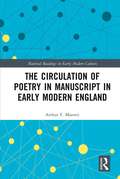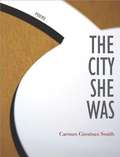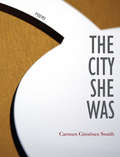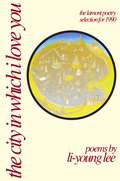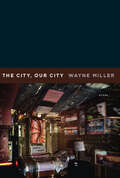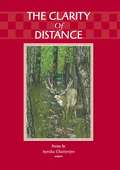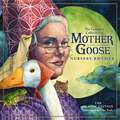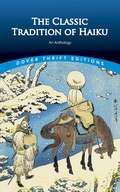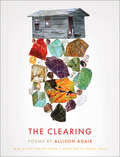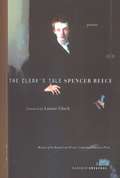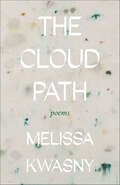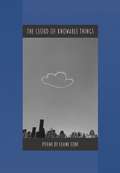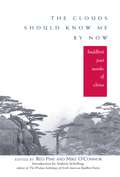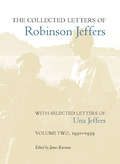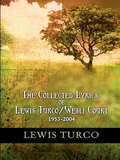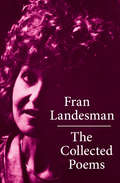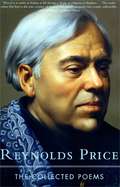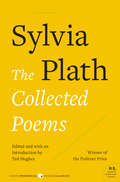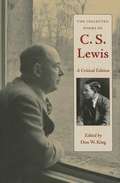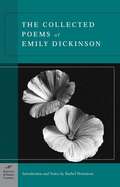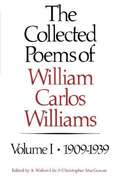- Table View
- List View
The Circulation of Poetry in Manuscript in Early Modern England (Material Readings in Early Modern Culture)
by Arthur F. MarottiThis study examines the transmission and compilation of poetic texts through manuscripts from the late-Elizabethan era through the mid-seventeenth century, paying attention to the distinctive material, social, and literary features of these documents. The study has two main focuses: the first, the particular social environments in which texts were compiled and, second, the presence within this system of a large body of (usually anonymous) rare or unique poems. Manuscripts from aristocratic, academic, and urban professional environments are examined in separate chapters that highlight particular collections. Two chapters consider the social networking within the university and London that facilitated the transmission within these environments and between them. Although the topic is addressed throughout the study, the place of rare or unique poems in manuscript collections is at the center of the final three chapters. The book as a whole argues that scholars need to pay more attention to the social life of texts in the period and to little-known or unknown rare or unique poems that represent a field of writing broader than that defined in a literary history based mainly on the products of print culture.
The City She Was
by Carmen Giminez Smith"When you open this book, expect serious role-playing and syntactic tap dancing. The City She Was presents a world that brings 'the horizon line into your lexicon' and a poet's muse ('The Endangered You') is lent to a friend and returned 'a little more frayed.' Giménez Smith muddles and enchants with her many masks, leaving the ground a little less stable under our feet." -Matthea Harvey, author of Modern Life, Sad Little Breathing Machine, and Pity the Bathtub Its Forced Embrace of the Human Form
The City She Was (Mountain West Poetry Series)
by Carmen Giménez Smith Carmen Giménez SmithMountain West Poetry Series Published by the Center for Literary Publishing at Colorado State University
The City in Which I Love You
by Li-Young LeeContentsI.Furious VersionisII.The InterrogationThis Hour And What Is DeadArise, Go DownMy Father, In Heaven, Is Reading Out LoudFor A New Citizen Of These United StatesWith RuinsIII.This Room And Everything In ItThe City In Which I Love YouIV.The WaitingA StoryGoodnightYou Must SingHere I AmA Final ThingV.The Cleaving
The City in Which I Love You (American Poets Continuum)
by Li-Young LeeContentsI.Furious VersionisII.The InterrogationThis Hour And What Is DeadArise, Go DownMy Father, In Heaven, Is Reading Out LoudFor A New Citizen Of These United StatesWith RuinsIII.This Room And Everything In ItThe City In Which I Love YouIV.The WaitingA StoryGoodnightYou Must SingHere I AmA Final ThingV.The Cleaving
The City, Our City: Poems
by Wayne Miller“[A] wide-ranging, fascinating series of poems that [has] the city as character at its center, the city as a collective soul, the city as idea.” —Sycamore ReviewA William Carlos Williams Award FinalistA Kansas City Star Top Book of the YearA Library Journal Top Winter Poetry PickA series of semi-mythologized, symbolic narratives interspersed with dramatic monologues, the poems collected in The City, Our City showcase the voice of a young poet striking out, dramatically, emphatically, to stake his claim on “the City.” It is an unnamed, crowded place where the human questions and observations found in almost any city—past, present, and future—ring out with urgency. These poems—in turn elegiac, celebratory, haunting, grave, and joyful—give hum to our modern experience, to those caught up in the City’s immensity, and announce the arrival of a major new contemporary poet.
The Clarity Of Distance
by Ayesha ChatterjeeSomeone once asked Ayesha Chatterjee what idiom she wrote in. She still doesn't know what the answer to that is, but the poems in this collection attempt to address the issue behind that question: that of belonging versus the universality of experience. Written in spare language and often using metaphors drawn from both Eastern and Western sources, these poems pare down the complexity of existence in today's global world into simple moments of truth. Much of her poetry is very short, ten lines or less, some of it is photographic and all of it is approachable. Chatterjee believes that the power of poetry is in its accessibility and this is reflected in the simplicity of her writing. Her poetry is intended to pry her readers out of complacency into looking at the world differently, perhaps even into thinking of their place in it. There is a soft thread of violence running thinly through this collection juxtaposed against the imagery in much the same way as the intention of her approach.
The Classic Collection of Mother Goose Nursery Rhymes: Over 100 Cherished Poems and Rhymes for Kids and Families (The Classic Edition)
by Mother GooseRediscover the timeless nursery rhymes of Mother Goose in this gorgeous picture book, packed with beautiful, full-color illustrations and a stunning four-panel gatefold! These charming bedtime stories and fairy tales will delight and enchant children of all ages.Children and adults alike will be charmed by this freshly presented collection of classic nursery rhymes, featuring more than 100 enchanting and colorful illustrations by Rhode Island School of Design illustrator, Gina Baek.This Classic edition of The Classic Collection of Mother Goose Nursery Rhymes:Features a beautiful dust jacket and four-page fold out illustrationIs great for children ages 5+Perfect for family read alouds or as bedtime storiesMakes a great gift for young families, new parents, baby showers, or holiday&’sRediscover favorite tales, rhymes, and stories such as:Twinkle, Twinkle Little StarHumpty DumptyJack and JillThe Cat and the FiddleBaa, Baa, Black Sheepand more!
The Classic Tradition of Haiku: An Anthology (Dover Thrift Editions)
by Faubion BowersA highly distilled form of Japanese poetry, haiku consists of seventeen syllables, usually divided among three lines. Though brief, they tell a story or paint a vivid picture, leaving it to the reader to draw out the meanings and complete them in the mind's eye. Haiku often contains a hidden dualism (near and far, then and now, etc.) and has a seasonal tie-in, as well as specific word-images that reveal deeper layers in each poem.This unique collection spans over 400 years (1488-1902) of haiku history by the greatest masters: Bashō, Issa, Shiki, and many more, in translations by top-flight scholars in the field. Haiku commands enormous respect in Japan. Now readers of poetry in the West can savor these expressive masterpieces in this treasury compiled by noted writer Faubion Bowers, who provides a Foreword and many informative notes to the poems.
The Clearing: Poems (Max Ritvo Poetry Prize Ser.)
by Allison AdairA poetry debut that&’s &“a lush, lyrical book about a world where women are meant to carry things to safety and men leave decisively&” (Henri Cole). Luminous and electric from the first line to the last, Allison Adair&’s debut collection navigates the ever-shifting poles of violence and vulnerability with a singular incisiveness and a rich imagination. The women in these poems live in places that have been excavated for gold and precious ores, and they understand the nature of being hollowed out. From the midst of the Civil War to our current era, Adair charts fairy tales that are painfully familiar, never forgetting that violence is often accompanied by tenderness. Here we wonder, &“What if this time instead of crumbs the girl drops / teeth, her own, what else does she have&”?The Clearing knows the dirt beneath our nails, both alone and as a country, and pries it gently loose until we remember something of who we are, &“from before . . . from a similar injury or kiss.&” There is a dark beauty in this work, and Adair is a skilled stenographer of the silences around which we orbit. Described by Henri Cole as &“haunting and dirt caked,&” her unromantic poems of girlhood, nature, and family linger with an uncommon, unsettling resonance.Winner of the 2019 Max Ritvo Poetry PrizePraise for The Clearing &“A dark and bodily nod to folk- and fairy-tale energy.&” —Boston Globe &“The poems in Adair&’s debut draw on folklore and the animal world to assert feminist viewpoints and mortal terror in lush musical lines, as when &“A fat speckled spider sharpens / in the shoe of someone you need.&” —New York Times Book Review, &“New & Noteworthy Poetry&” &“Like Grimms&’ fairy tales, Adair&’s poems are dark without being bleak, hopeless, or disturbing. Readers will find the collections lush language and provocative imagery powerfully resonant.&” —Publishers Weekly (Starred Review)
The Clerk's Tale
by Spencer ReeceIn a recent double fiction issue, The New Yorker devoted the entire back page to a single poem, "The Clerk's Tale," by Spencer Reece. The poet who drew such unusual attention has a surprising background: for many years he has worked for Brooks Brothers, a fact that lends particular nuance to the title of his collection. The Clerk's Tale pays homage not only to Chaucer but to the clerks' brotherhood of service in the mall, where "the light is bright and artificial, / yet not dissimilar to that found in a Gothic cathedral." The fifty poems in The Clerk's Tale are exquisitely restrained, shot through with a longing for permanence, from the quasi-monastic life of two salesmen at Brooks Brothers to the poignant lingering light of a Miami dusk to the weight of geography on an empty Minnesota farm. Gluck describes them as having "an effect I have never quite seen before, half cocktail party, half passion play . . . We do not expect virtuosity as the outward form of soul-making, nor do we associate generosity and humanity with such sophistication of means, such polished intelligence . . . Much life has gone into the making of this art, much patient craft."
The Closure of Space in Roman Poetics
by Victoria RimellThis ambitious book investigates a major yet underexplored nexus of themes in Roman cultural history: the evolving tropes of enclosure, retreat and compressed space within expanding, potentially borderless empire. In Roman writers' exploration of real and symbolic enclosures - caves, corners, villas, bathhouses, the 'prison' of the human body itself - we see the aesthetic, philosophical and political intersecting in fascinating ways, as the machine of empire is recast in tighter and tighter shapes. Victoria Rimell brings ideas and methods from literary theory, cultural studies and philosophy to bear on an extraordinary range of ancient texts rarely studied in juxtaposition, from Horace's Odes, Virgil's Aeneid and Ovid's Ibis, to Seneca's Letters, Statius' Achilleid and Tacitus' Annals. A series of epilogues puts these texts in conceptual dialogue with our own contemporary art world, and emphasizes the role Rome's imagination has played in the history of Western thinking about space, security and dwelling.
The Cloud Path: Poems
by Melissa KwasnyAn imaginative reworking of the elegy that focuses on the difficult work of being with the dying.At the heart of The Cloud Path, celebrated author Melissa Kwasny’s seventh collection of poetry, lies the passing of her beloved mother: the caretaking, the hospice protocols, the last breath, the aftermath. Simultaneously, she must also reckon with an array of global crises: environmental decline, the arrival of a pandemic, divisive social tensions. With so much loss building up around her, Kwasny turns to the natural world for guidance, walking paths lined with aspen, snow geese, and prickly pears. “I have come here for their peace and instructions,” she writes, listening to the willows, the “slant rhyme of their multi-limbed clatter.”What she finds is a new, more seasoned kind of solace. The Cloud Path glimmers with nature’s many lively colors—the “burnt orange” of foxes, “cedar / bark cast in the greenest impasto,” white swans intertwined. It also embraces the world’s harsher elements—a dark bog’s purple stench, a hayfield empty of birds. Witnessing life’s constant ebb and flow, the weight of personal and collective grief gradually becomes lighter. The shapes of clouds, cattle bones by the river. “Why not,” she asks, “believe it matters?Evocative and wrenching, The Cloud Path compels us to consider the whole of living and dying. An elegant juxtaposition of personal and planetary loss, these keen and tender poems teach us to see afresh in the lateness of things.
The Cloud of Knowable Things: Poems
by Elaine Equi"Friend to objects, saints and dead celebrities alike, Elaine Equi is the real McCoy: a keeper of the sacred flame of language--joy. Her work re-alerts us to our earliest love of words as toys, jewels, confections. In doing so she juices up our thinking. What's better than writing that delights as it sharpens the mind? You've heard of 'smart drinks' or 'smart drugs,' said to chemically boost intellect? These are truly smart poems." -Amy Gerstler, L. A. Weekly. Elaine Equi is the author of many books, including Voice-Over, which won the San Francisco State Poetry Award. Widely anthologized, her poems appear in Postmodern American Poetry: A Norton Anthology and The Best American Poetry for the years 1989, 1995, and 2002.
The Clouds Should Know Me By Now
by Burton Watson Mike O'Connor Red Pine Andrew Schelling James Sanford J. P. Seaton Paul HansenThis unique collection presents the verse, much of it translated for the first time, of fourteen eminent Chinese Buddhist poet monks. Featuring the original Chinese as well as english translations and historical introductions by Burton Watson, J.P. Seaton, Paul Hansen, James Sanford, and the editors, this book provides an appreciation and understanding of this elegant and traditional expression of spirituality. "So take a walk with...these cranky, melancholy, lonely, mischievous poet-ancestors. Their songs are stout as a pilgrim's stave or a pair of good shoes, and were meant to be taken on the great journey." --Andrew Schelling, from his Introduction
The Collected Essays of Leslie Fiedler: Vol. I
by Leslie A. FiedlerEssays on culture, particularly with regard to literature and ideas.
The Collected Letters of Robinson Jeffers
by Robinson Jeffers Una JeffersThe 1930s marked a turning point for the world. Scientific and technological revolutions, economic and social upheavals, and the outbreak of war changed the course of history. The 1930s also marked a turning point for Robinson Jeffers, both in his career as a poet and in his private life. The letters collected in this second volume of annotated correspondence document Jeffers' rising fame as a poet, his controversial response to the turmoil of his time, his struggles as a writer, the growth and maturation of his twin sons, and the network of friends and acquaintances that surrounded him. The letters also provide an intimate portrait of Jeffers' relationship to his wife Una--including a full account of the 1938 crisis at Mabel Dodge Luhan's home in Taos, New Mexico that nearly destroyed their marriage.
The Collected Lyrics
by Lewis TurcoThis volume comprises the collected lyrics of Lewis Turco and Wesli Court written between 1953 and 2004. Turco is one of this nation's most prominent poets. His Book of Forms is considered any serious poet's "bible." The recipient of many honors and awards, Turco lives in Dresden, Maine, with his wife Jean.
The Collected Poems
by Fran LandesmanPoet and lyricist Fran Landesman occupies the ironic territory between Dorothy Parker and Edna St. Vincent Millay. Landesman's work combines pathos and humor and glows with the tough wisdom gleaned from a lifetime of riding in fast convertibles and hanging out in smoky bars. This ebook contains Landesman's books Invade My Privacy, The Ballad of the Sad Young Men and Other Verse, and More Truth Than Poetry.
The Collected Poems
by Reynolds PriceThis volume presents the full range of Reynolds Price's poetic accomplishment over the past thirty-six years. His first three collections are brought together in their entirety; and a masterful new collection, The Unaccountable Worth of the World, is introduced. In his preface to The Collected Poems, Price credits guides as various as Miss Jane Alston, a public school English teacher in North Carolina, and W. H. Auden, one of his teachers at Oxford University. The sure trajectory of Price's development as a poet is traced from the "inexplicable elation" of his adolescent discovery of Emily Dickinson, to a lengthy immersion in John Milton's "polyphonic language, with its ready access to the eloquence of plain speech," to the four-stress rhythm of the Anglo-Saxons and Coleridge on which his work often continues to depend -- that rhythm being "closely allied to the wary economy and dignity of those kinds of speech that, in my lifetime, have been most concerned for lucid and memorable communication." Those familiar with Price's earlier work will welcome having in one volume such vivid contributions as "The Annual Heron" (from Vital Provisions), "House Snake" (The Laws of Ice) and "An Afterlife, 1953 -- 1988" (The Use of Fire). All will be introduced for the first time to his latest poems from the journal called "Days and Nights." This notebook was begun in the early 1980s, shortly before Price was diagnosed with a grave illness; and the entries continue in the second of three parts of The Unaccountable Worth of the World, many of them contending with the death of friends -- "the Dying Belt, as my father called it." The whole new collection culminates in the powerful departures of such poems as "Scored by Light" and "The Closing, The Ecstasy." The Collected Poems reveals, throughout, the accumulated variety of Reynolds Price's years as a poet -- the thematic breadth, formal steadiness, narrative vitality and intense lyricism that have marked his work since 1961. It is a landmark in his creative life and in the span of contemporary American verse.
The Collected Poems (P. S. Series)
by Sylvia PlathA new edition of Sylvia Plath's Pulitzer Prize-winning Collected Poems, edited and with an introduction by Ted Hughes
The Collected Poems Of C. S. Lewis
by C. S. Lewis Don W. KingAlthough C. S. Lewis is best known for his prose and for his clear, lucid literary criticism, Christian apologetics, and imaginative Ransom and Narnia stories, he considered himself a poet for the first two and a half decades of his life. Owen Barfield recalls that anyone who met Lewis as a young man in the early 1920s at Oxford University quickly learned he was one “whose ruling passion was to become a great poet. At that time if you thought of Lewis you automatically thought of poetry.” The Collected Poems of C. S. Lewis offers readers, for the first time, a one-volume collection of Lewis’s poetry, including many poems that have never appeared in print. With the poems arranged in chronological order, this volume allows readers the opportunity to compare the poetry Lewis was writing while he was also writing his fiction and nonfiction prose. Beginning with his earliest lyric poems from 1907, The Collected Poems of C. S. Lewis follows Lewis’s efforts to write long, narrative poems, which were particularly influenced by Norse mythology. His outburst of lyric poetry as a young man in the trenches during World War I culminates in his first published work, Spirits in Bondage (1919), followed by his most ambitious narrative poem, Dymer (1926). Both volumes afford unique insights into Lewis the atheist. After his conversion to Christianity in 1930, Lewis wrote a collection of sixteen religious lyrics that he included in The Pilgrim’s Regress (1933); as a group, these are considered among his best poems. Until his death in 1963, Lewis continued writing and publishing poetry, often appearing in journals and magazines under his pseudonym N. W., shorthand for the Anglo-Saxon nat whilk, “[I know] not whom.” As a whole, these latter poems are either occasional verses, burlesques, and erudite satires or they are contemplative poems musing upon the human condition and its pain, joy, suffering, pride, love, doubt, and faith. The Collected Poems of C. S. Lewis demonstrates a dedicated, determined, and passionate poet at work and illustrates the degree and depth to which poetry shaped Lewis’s literary, intellectual, emotional, and spiritual life.
The Collected Poems Of Emily Dickinson
by Emily Dickinson Rachel WetzsteonThe Collected Poems of Emily Dickinson, by Emily Dickinson, is part of the Barnes & Noble Classics series, which offers quality editions at affordable prices to the student and the general reader, including new scholarship, thoughtful design, and pages of carefully crafted extras. All editions are beautifully designed and are printed to superior specifications; some include illustrations of historical interest. Barnes & Noble Classics pulls together a constellation of influences--biographical, historical, and literary--to enrich each reader's understanding of these enduring works. Born in Amherst, Massachusetts in 1830, Dickinson began life as an energetic, outgoing young woman who excelled as a student. However, in her mid-twenties she began to grow reclusive, and eventually she rarely descended from her room in her father’s house. She spent most of her time working on her poetry, largely without encouragement or real interest from her family and peers, and died at age fifty-five. Only a handful of her 1,775 poems had been published during her lifetime. When her poems finally appeared after her death, readers immediately recognized an artist whose immense depth and stylistic complexities would one day make her the most widely recognized female poet to write in the English language. Dickinson’s poetry is remarkable for its tightly controlled emotional and intellectual energy. The longest poem covers less than two pages. Yet in theme and tone her writing reaches for the sublime as it charts the landscape of the human soul. A true innovator, Dickinson experimented freely with conventional rhythm and meter, and often used dashes, off rhymes, and unusual metaphors--techniques that strongly influenced modern poetry. Dickinson’s idiosyncratic style, along with her deep resonance of thought and her observations about life and death, love and nature, and solitude and society, have firmly established her as one of America’s true poetic geniuses.
The Collected Poems Of William Carlos Williams: 1909-1939
by William Williams Christopher MacGowan A. LitzSo that readers could more fully understand the extent of Williams' radical simplicity, all of his published poetry, excluding Paterson, was reissued in two definite volumes, of which this is the first.
